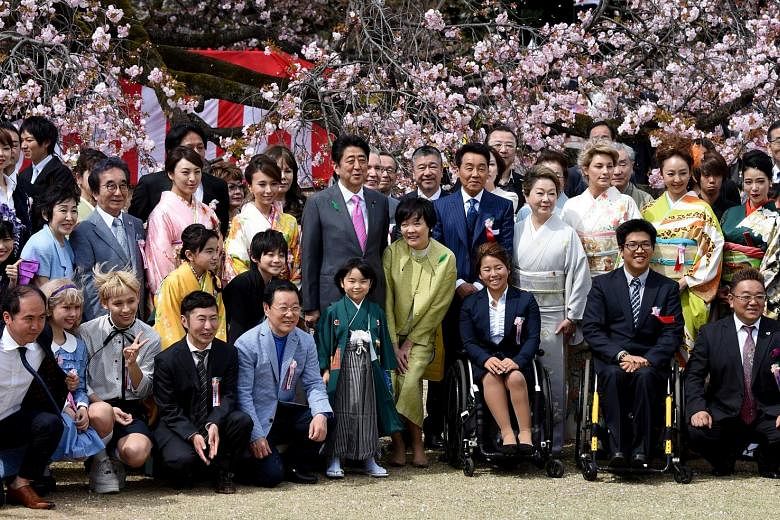The ghosts of an old scandal have returned to haunt former Japanese prime minister Shinzo Abe, whose key aides are being investigated for their role in a cherry blossom party controversy.
Questions were raised earlier this year over the ballooning budget and guest list for the annual event at the Shinjuku National Garden that dates back to 1952.
Despite being an invite-only event for VIPs such as members of the diplomatic corps and businessmen, Mr Abe had also extended invitations to loyal voters from his constituency in Yamaguchi prefecture in western Japan.
Under opposition questioning in the Diet, Mr Abe said the guest lists were shredded after the event and that there was no existing soft copy.
The criminal investigation centres on the dinner banquets at five-star hotels that Mr Abe hosted for his guests on the eve of the sakura garden party event.
Participants were charged only 5,000 yen (S$64.30) - less than half the market rate of at least 11,000 yen per head.
Mr Abe's office is suspected of defraying the shortfall of more than nine million yen between 2013 and 2019, in what might be a violation of the Political Funds Control Law and Public Offices Election Law.
The probe stems from a criminal complaint petition filed in May by about 660 lawyers and scholars. It was one of the top stories in Japanese media all week - second only to the Covid-19 surge that saw another one-day record tally of at least 2,678 cases yesterday.
When Mr Abe was dogged by the scandal earlier this year, he denied in the Diet that his office had made up the shortfall while insisting that no receipts were ever issued by the hotels.
But the Tokyo Prosecutors' Office has obtained testimony that the receipts had, in fact, been issued to a fund management organisation helmed by Mr Abe.
An aide has confessed to binning the receipts, in effect discarding evidence that the office had covered part of the dinner function costs. The aide has also said that it was a mistake not to have recorded the expenditure on the books.
There is also the separate issue of whether Mr Abe and his Chief Cabinet Secretary Yoshihide Suga - now the prime minister - knowingly lied to Parliament.
A tally by the Mainichi daily showed that Mr Abe had given what might be constituted as false statements at least 33 times.
Opposition leader Yukio Edano of the Constitutional Democratic Party of Japan said last week that Mr Abe was "flagrantly ridiculing Diet deliberations".
As it is, rumours are spreading in the political nerve centre of Nagatacho that there may be a power struggle within the ruling Liberal Democratic Party, given the sudden revelations through source-based leaks to the media over the last week.
This comes as Mr Abe became relatively more active in recent weeks since resigning as prime minister over health reasons in September, leading to speculation that he might be angling for another comeback to the top job.
Mr Suga, meanwhile, is facing what is perhaps his sternest leadership test thus far with the third wave of Covid-19 infections.
The opposition is also taking aim at him for his role in spreading falsehoods through the echoing of Mr Abe's statements over the scandal. Mr Suga told the Diet last week: "If the facts turn out to be different, then I must, of course, take responsibility for my responses."
Japanese media across the political divide have been critical. The liberal Asahi Shimbun called Mr Abe's conduct "unconscionable".
The pro-government Sankei Shimbun, citing cases in Japanese political history where secretaries have been the fall guy, said: "We hope Mr Abe, as former PM, can show a clean appearance that sets him apart from the ugliness of the past."
Sophia University political scientist Koichi Nakano told The Sunday Times that Mr Suga risks being seen as a part of the cover-up if Mr Abe refuses to answer opposition questions in the Diet. "Ordinarily, politicians resign if found to do something immoral, even if not illegal, but Abe brought a new political culture," he said, noting the string of scandals that occurred during Mr Abe's time in office.

